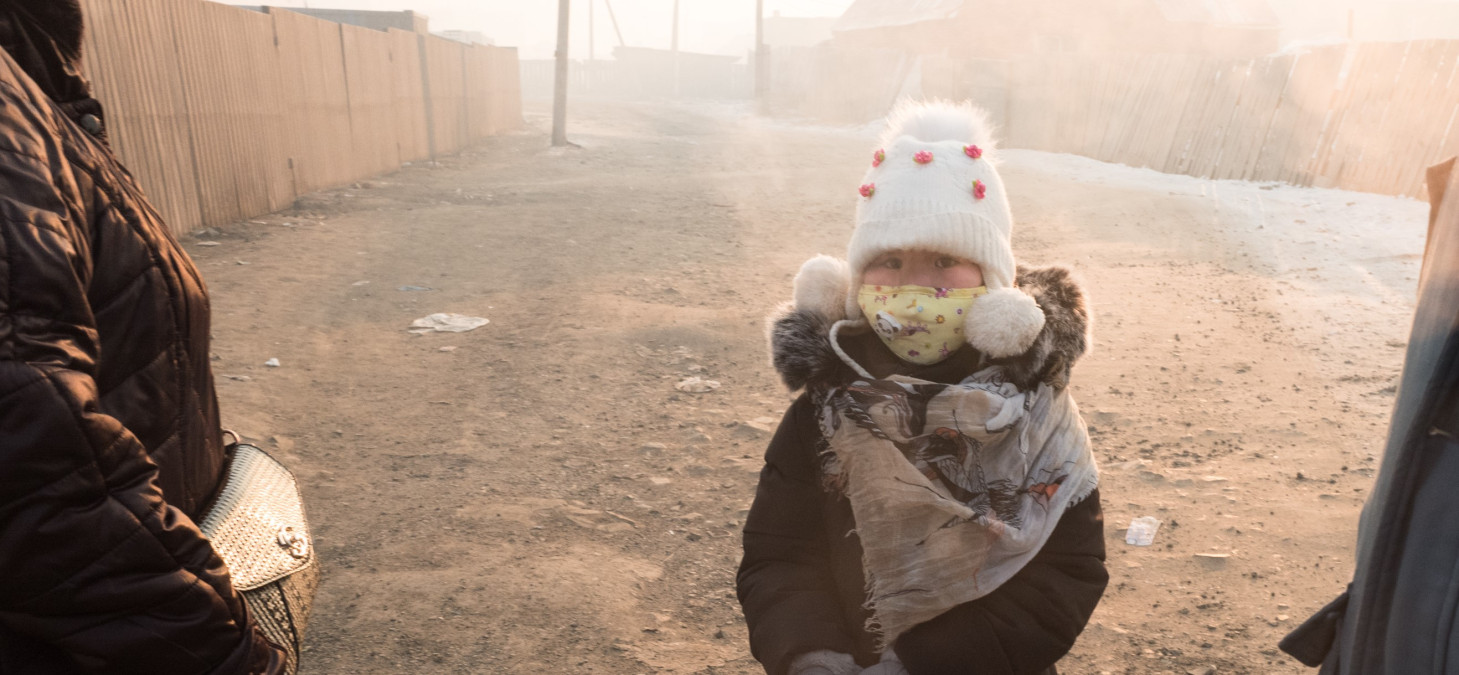Protecting children from Ulaanbaatar's toxic air
Published: Dec 18, 2019 Reading time: 4 minutes Share: Share an articleEnkhjin, is a 6-year-old girl from Ulaanbaatar, Mongolia. She lives with her family inside a traditional Mongolian home known as a ger (yurt). She’s not much different than other children her age around the world. She loves playing with her friends and going to school. What makes her story different is her commute to and from school. During winter months, Enkhjin’s commute exposes her to some of the highest levels of air pollution on Earth. Every breathe she takes on her way to school is 4-5 times more toxic than what is recommended by the World Health Organization (WHO).

The winters of Ulaanbaatar, the world’s coldest capital city, are notorious for the high levels of air pollution. The ger districts in the northern part of the capital city are comprised mainly by gers or detached houses that are not connected to central heating, water or sewage system are now home to more than 60% of Ulaanbaatar’s 1.5 million population.
The primary source of air pollution in winter months was the raw coal burnt by households in ger districts for heating until the Government of Mongolia banned the use of raw coal in May 2019. To support the Government and urban residents to address these challenges, People In Need, through a series of EU and Czech funded projects, have introduced interventions to reduce air pollution and its health impacts.
In order to help children like Enkhjin, People In Need is working to strengthen access to information, awareness, and corresponding actions addressing air pollution in urban Mongolia through the installation of 50 IQAir AirVisual air quality monitors (AQMs). These AQMs enable the public access real-time air quality information within Right to Breathe (R2B) project. To date, 23 monitors were installed outdoors and 17 indoors including public schools and hospitals in Ulaanbaatar city.
In the most polluted parts of Ulaanbaatar Air Quality Indicators (AQI) frequently go above 500, a level deemed hazardous by the scientific community. PM2.5 (particulate matter with a diameter of less than 2.5 micrometers) are as high as 500 micrograms per cubic meter, 50 times higher than the WHO recommended level.
These new monitors have increased the locations showing air quality indexes publicly available, and providing visibility in areas and cities where there had been no outdoor AQM system, and furthering understanding of the impacts of indoor pollution. Citizens can now freely access real-time air quality information close to them from this new monitoring network, and use it to take actions to protect health by installing the Airvisual application on their mobile devices of more than 20 new locations in Mongolia, with health recommendations in English and Mongolian.
Community mapping reveals challenges
People in Need in Mongolia in partnership Ger Community Mapping Center (GCMC) conducted a mapping analysis from December 2019 to April 2019 on nine people to see how each individual is exposed to air pollution. The nine people included men and women of different ages and professions and children. The analysis showed that no matter where you leave, work or study they are all exposed to air pollution.
Otgontsetseg, a fifteen year girl living in northern district of Ulaanbaatar, the capital city of Mongolia, goes to school at 7:00 am and she is breathing 2-6 times polluted air than the recommended level. She spends about 5-6 hours at school and 16 hours at home, but unfortunately, indoor air pollution whether at home or school is even worse, it is high above the recommended level.
Especially, the schoolchildren who commute from home to school are exposed to air pollution exceeding the recommended level 4-6 times. The indoor air quality in the households of ger districts is exceeding by 2-25 times. In order to reduce the exposure to air pollution, the households need to improve the insulation and ventilation of the gers and houses. People in Need has developed 10 recommendations to raise awareness on air pollution.
If you’d like to support the children of Ulaanbaatar, please consider donating US$3.20 to support People In Need’s work. The donation will be used to purchase a mask and provide trainings to the children on how they can protect themselves from air pollution.
Right to Breathe project is funded by the European Union, with additional support from the US Embassy, and implemented by People in Need NGO, partnering with Ger Community Mapping Center, Mongolian Women Lawyers’ Association and Mongolian Environmental Civil Council.







